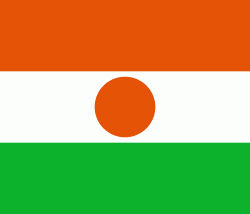Flag of Niger
The Flag of Niger (drapeau du Niger) has been the national flag of the Republic of the Niger since 1959, a year prior to its formal independence from French West Africa. It uses the national colors of orange, white and green, in equal horizontal bands, with an orange roundel in the center. The flag forms one of the official national symbols of the Republic of the Niger, along with the coat of arms, the National Anthem ("la Nigérienne"), and the national motto: "Fraternité, Travail, Progrès".
Prior to independence from French West Africa, the flag of Niger was adopted by the Territorial Assembly of the Niger Colony on 23 November 1959, shortly before the proclamation of the Republic within the French Community on 18 December 1959. The flag was designed in 1958. It was retained upon independence in 1960 and has remained unchanged through to the 2010 Constitution.
Prior to independence from French West Africa, the flag of Niger was adopted by the Territorial Assembly of the Niger Colony on 23 November 1959, shortly before the proclamation of the Republic within the French Community on 18 December 1959. The flag was designed in 1958. It was retained upon independence in 1960 and has remained unchanged through to the 2010 Constitution.
National flag
Country - Niger
Warning: getimagesize(/Image/Map/MP2440476.gif): failed to open stream: No such file or directory in /home/mapnlee7/public_html/MAPNALL/article.php on line 532
 |
 |
It is one of the least developed countries and is also one of the poorest countries in the world by GDP per capita. Some non-desert portions of the country underwent periodic drought and desertification. The economy is concentrated around subsistence agriculture, with some export agriculture in the less arid south, and export of raw materials, including uranium ore. It faces challenges to development due to its landlocked position, desert terrain, low literacy rate, jihadist insurgencies and the world's highest fertility rates due to birth control not being used and the resulting rapid population growth.
